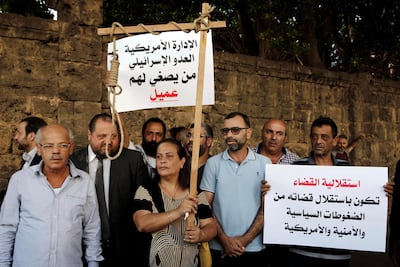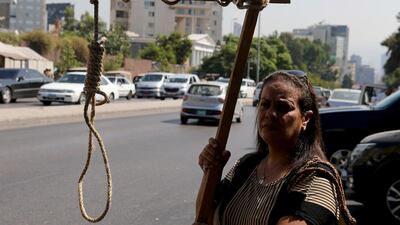No words were strong enough for protesters at the court appearance on Tuesday of Amer Fakhoury, a former member of the South Lebanon Army who defected to Israel in 1998, as they accused him of being a "butcher".
A man carrying a small hangman’s noose even called for his execution, though Lebanon has an unofficial moratorium on the death penalty.
The recent return of Mr Fakhoury, 56, has caused scandal in Lebanon and shone a spotlight on the enduring divide between those who collaborated with Israel during its 22-year occupation of South Lebanon and those who fought it.
Mr Fakhoury, who has American, Israeli and Lebanese citizenship, was a free man until he set foot in Lebanon earlier this month, 21 years after leaving. The reason of his return remains unclear.
But the news of his arrival, made public last Thursday by Al Akhbar, a local newspaper known for its sympathies to Israel's archenemy Hezbollah, caused an uproar.
One politician called for him to be publicly executed, and no one stepped forward to defend him.
Working for Israel remains one of the biggest taboos in Lebanon, and anti-Israeli parties such as Hezbollah wield significant power in the government.
The scandal pressured Lebanese authorities to arrest Mr Fakhoury, who confessed he had worked for Israel during its occupation of South Lebanon between 1978 and 2000.
According to Al Akhbar, Mr Fakhoury left Lebanon for Israel in 1998 before settling in the US.
On Tuesday, an investigative judge issued an arrest warrant against Mr Fakhoury after postponing his interrogation because his American lawyers were not allowed into Beirut's military court. They had not received permission from the bar association.
Demonstrators outside the court said that Mr Fakhoury should also be tried for other crimes, such as torture and acquiring Israeli citizenship.

Becoming an Israeli citizen and communication with and entering Israel are all crimes in Lebanon.
Mr Fakhoury's name is synonymous with the notorious Khiam prison, which he supervised for several years. Former detainees say that he was directly responsible for torture.
“All detainees knew his name,” said Ibrahim Qalash, a former inmate and one of the dozen or so protesters. “He oversaw all different kinds of torture: beatings, electric shocks, tying you to a pole in the sun or the cold.”
Mr Qalash, like other former inmates, accused Mr Fakhoury of ordering gas bombs to be thrown into the cells of rebellious prisoners in 1989, causing the death of two men.
“The words criminal or butcher are not strong enough to describe Amer Fakhoury,” said ex-detainee Abbas Kabalan.
Run by the SLA between 1985 and 2000, Khiam prison became a symbol of resistance against Israel.
Human rights organisations have accused Israel of being responsible for abuse committed inside the prison against thousands of prisoners, including imprisonment without charge and torture.
Israel denied any involvement in the prison’s management, saying the SLA was in charge, and bombed the site during the 2006 war with Hezbollah.
“The majority of inmates were civilians who were arrested by the SLA to put pressure on anti-Israel fighters or simply because they did not want their sons to be forcibly recruited by the SLA,” said Zara Fournier, who has just completed a doctoral thesis on memories of the Israeli occupation at Tours University in France.
"Conditions were extremely harsh, even though they improved slightly after 1995, when the International Committee of the Red Cross was allowed into Khiam," she told The National.
In 2000, the SLA disintegrated and up to 7,000 Lebanese fled with their families to Israel, though many also stayed behind. They were tried and sentenced to prison for, on average, a year.
Several former SLA fighters, whose leaders were mostly Christian, previously told The National that they collaborated with Israel to protect themselves against Palestinian fighters who fought Israel from Lebanese territory at the time.
As Christians, they said they feared being attacked, often referring to the 1976 massacre in the Christian village of Damour. Their opponents deny these allegations.
Today, untangling the facts from the myths that have grown up on both sides over the years to justify violence is difficult, and Lebanon remains deeply divided. “There are as many narratives of those years as there are stakeholders,” said Ms Fournier.
Ex-collaborators are vilified to this day and contact with those who fled to Israel is banned – return to Lebanon means facing a prison sentence.
“A collaborator is born, lives and dies a collaborator," Mr Kabalan says. "There is not a single day where he can be anything else.”

